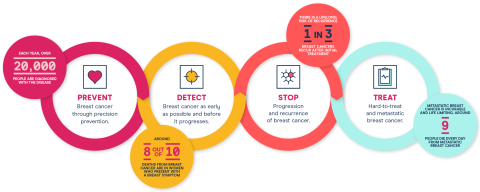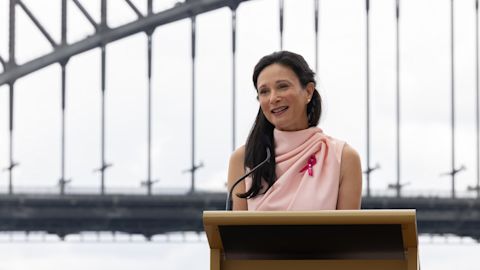Breast cancer is the second most diagnosed cancer in Australia and the most diagnosed in Australian women.
The National Breast Cancer Foundation is Australia's leading not-for-profit organisation funding research towards a vision of zero deaths from the disease.
As the charity partner for Sydney New Years’s Eve, we spoke with CEO Cleola Anderiesz to find out more about upcoming campaigns and fundraising efforts.
What is the National Breast Cancer Foundation's vision?
Since our inception in 1994, we’ve invested around $200m into more than 600 game-changing research projects across Australia. In this time, death rate from breast cancer in Australia has reduced by over 40%.
While this is progress to be proud of, the job is not done.
More than 20,000 Australians will be diagnosed with breast cancer and 3,200 people are expected to die as a direct result of a breast cancer diagnosis this year.
Thanks to partnerships like this one with the City of Sydney and the support of the Australian public, we can continue to fund research that will help change the future for people diagnosed with breast cancer.
How are you raising funds or running campaigns for Sydney New Year's Eve?
We’re running a national campaign called GLO PINK.
GLO PINK will shine a light on the 57 people diagnosed with breast cancer each day and the 9 people who die each day from the disease.
Everyone is invited to pink up their New Year’s Eve and raise funds for the National Breast Cancer Foundation to help save lives. You can GLO PINK with a pink party, pink decorations, pink outfit or decorate your event with pink lights.
The money raised from GLO PINK will be used to fund world-class research projects that save lives through a better understanding of how to prevent and detect breast cancer early, stop progression and recurrence of breast cancer and effectively treat hard-to-treat and metastatic breast cancers.
Can you tell us what programs or projects the money from Sydney New Year's Eve will support?
Research matters, and it is central and critical to improving breast cancer outcomes.
Over the next 5 years, we’ll invest up to $125m towards research to help end these deaths. The Pink Horizon Research Strategy is a bold and transformational plan to accelerate us towards our vision of zero deaths from breast cancer.
Proceeds from the partnership with Sydney New Year's Eve will help fund exceptional research aligned to our Pink Horizon Research Strategy and our ambitious vision.
Recently NBCF-funded research projects include understanding into why young women get breast cancer, new personalised treatments for hard-to-treat breast cancers, the effect of different treatments on the immune system and new hormonal treatments to prevent the spread of breast cancer.
We hope to fund more incredible research projects such as these, to help reduce the 3,200 deaths a year expected in Australia as a direct result of a breast cancer diagnosis.

Can you share some recent success stories or notable achievements?
A notable project is research to identify and learn more about the missing matches in familial breast cancer.
Around 7,500 Australians will be diagnosed with familial breast cancer over the next 5 years that can’t be explained by known genetic risk factors.
We’re investing in world-class research to uncover these unknown genetic faults that increase the risk of developing breast cancer.
Our research at the Peter MacCallum Cancer Centre led by Professor Ian Campbell in collaboration with Professor Paul James is using latest DNA sequencing technology together with clinical and biological information to look for new types of mutations that drive familial breast cancer risk.
While more research is needed before this information can be used in the clinic, Professors James and Campbell have identified over 40 suspect gene mutations and associations that may contribute to familial breast cancer risk.
This missing matches research could provide a better understanding of how we better prevent and manage the inherited risk factors of breast cancer in the future.
Published 5 December 2023, updated 28 February 2024



